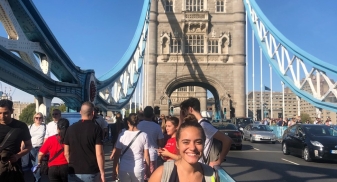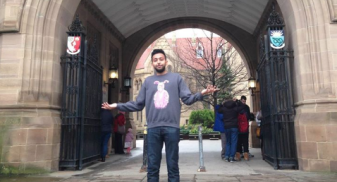University of Manchester (England)
The Program
As part of the prestigious Russell Group of universities and Manchester’s research and teaching quality is recognized across the globe.
With some 27,000 undergraduates, the University of Manchester ranks among the foremost research universities in England. Manchester can lay claim to 23 Nobel prizewinners among its current and former students and faculty. 8,000 international students from 180 countries make the Manchester student population one of the most diverse in the UK. In addition to top-quality academics, study abroad students are able to take advantage of a number of initiatives during their study in Manchester. These include a mentor scheme, International Society membership, and the opportunity to undertake service-learning.
Program Locations
England
Manchester
Manchester, a casualty of the Industrial Revolution—it was once known as Cottonopolis—is now a case study in urban evolution. Here you will find old textile mills revamped into eateries, shops, and theaters! The city also has terrific art galleries, including Manchester Art Gallery, the Whitworth, and the Currier. And as the city that gave the world Joy Division, The Stone Roses, and Oasis, Manchester rivals London in terms of its club and music scene. Don’t leave without catching a soccer match at one of Manchester’s two famous clubs, United or Manchester City.
Academics
In order to have an idea of what classes are available, you should visit the University of Manchester website. Please note the high-demand and subject area with restrictions as you begin to choose classes.
When looking for courses, be sure that you are looking at courses for undergraduate students only and that you are looking at classes in the correct term of study. The Manchester course codes indicate semester availability. If the course code ends in a 1, it means this course is only available in semester 1; if the code ends in a 2, it means the course is only available in semester 2; if the code ends in a 0, it means it is a full year-long course only.
Universities in the United Kingdom typically use a three-year curriculum; thus, courses listed as “Level 1,” “Level 2,” and “Level 3” do not necessarily translate into first, second, and third year courses in the American system. Students in the past have recommended taking courses at Level 1 or Level 2. Unlike the U.S. university system, universities in England offer upper-level courses at Levels 1 and 2. Courses at Level 3 tend to be rather advanced, much like our graduate courses, and students should pay particular attention to prerequisite requirements.
You will need to be sure that you are registered as a full time student according to Manchester and Rutgers University. That means that you will take 60 Manchester credits or 15 Rutgers credits per semester. The credit translation system between Manchester and Rutgers University is 4:1, meaning a 20-credit course at the University of Manchester will be a 5-credit course on your Rutgers University transcript. It is not possible to take classes as not-for-credit or pass/fail.
For information about Study Abroad credit transfer, registration, and transcripts please visit the Academics section of our website.
Housing and Meals
Students are normally housed in university residence halls in single or en-suite rooms with private or shared baths. There are no “American-only” residences. Accommodations are located on or near campus. Your particular placement is made entirely at the discretion of the University of Manchester. You may choose between housing that includes a meal plan (catered housing), or housing that provides kitchen space in which you can cook your own meals (self-catered housing).
You should not count on being able to stay in your room during official university breaks. You will need to visit University of Manchester Accommodation Office upon your arrival in order to reserve space during university breaks. You may be charged a fee per day for using rooms during the breaks. You may also be asked to change rooms during the breaks so that repairs can be done.
In order to learn more about your choices of accommodation, please visit the University of Manchester web page.
Financial Information
Program Costs
| NJ Resident | non-NJ Resident | |
|---|---|---|
| ATW Program Cost* | $10,500 | $14,700 |
Program Cost includes:
• Tuition
• UK Excursion
• Administrative Fees
• Emergency Medical Access Abroad
• *Access the World (ATW)
Out-of-Pocket Costs
| Housing (average: cost will vary by accommodation type) | $4,400 |
| Meals | $2,600 |
| Airfare | $1,200 |
| Local Transportation | $300 |
| Books and Classroom Materials | $250 |
| Personal Expenses | $1,000 |
| Total | $9,750.00 |
Out-of-Pocket Cost includes:
The above costs are estimations and represent the known out-of-pocket costs students encounter during their time abroad.
Some of these expenses will be paid for prior to going abroad, such as an airline ticket and visa costs, while some of these expenses, such as meals and local transportation, will be paid in-country as part of your daily expenses. As you plan, you will need to budget these costs and spend wisely throughout your time abroad.
Program Costs
| NJ Resident | non-NJ Resident | |
|---|---|---|
| ATW Program Cost* | $10,500 | $14,700 |
Program Cost includes:
• Tuition
• UK Excursion
• Administrative Fees
• Emergency Medical Access Abroad
• *Access the World (ATW)
Out-of-Pocket Costs
| Housing (average: cost will vary by accommodation type) | $4,400 |
| Meals | $2,600 |
| Airfare | $1,200 |
| Local Transportation | $300 |
| Books and Classroom Materials | $250 |
| Personal Expenses | $1,000 |
| Total | $9,750.00 |
Out-of-Pocket Cost includes:
The above costs are estimations and represent the known out-of-pocket costs students encounter during their time abroad.
Some of these expenses will be paid for prior to going abroad, such as an airline ticket, while some of these expenses, such as meals and personal expenses, will be paid in-country as part of your daily expenses. As you plan, you will need to budget these costs and spend wisely throughout your time abroad.


